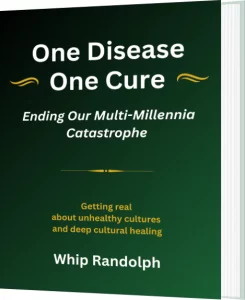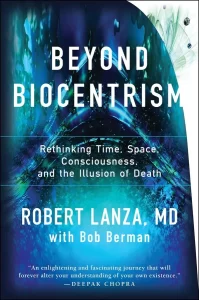
One disease one cure cover
If you found yourself in a bad situation, say living in an extremely toxic and unhealthy society, but really any problem, what is the first thing a wise person might do?
One answer is they’d trying to find out if anyone else had a solution which had worked.
Now ever since the rise of Kings I don’t think there have been a lot of cases of civilizations which caught the disease of having rulers and ruled finding a good way out, but if you live in an unhealthy society, you may want to find a healthy society and see how it functions.
That sets out the end-goal. “We’re here, we need to get to something like that.”
Of course, you’re not an idiot, this doesn’t mean giving up all technology, say, if the healthy society has less tech. It means distilling the principles that makes a society healthy, and aiming for that.
This is what Whip Randolph set out to do in his life, and it’s what his book, “One Disease, One Cure” tries to explain to readers.
I have to admit, my eyebrows lifted at the start. Whip’s firmly in the “there are and have been healthy indigenous society and we should look at them.” There’s a whole genre of writing in this tradition, and eyes tend to roll at it, especially because one wonders if such societies could scale.
It’s not that societies which are more caring than ours don’t exist. There’s a ton of ethnographic literature and accounts from anthropologists, visitors and even missionaries who describe those societies. Even Christopher Columbus praised the Arawaks to the Heavens as being the best people alive, before proceeding to enslave and slaughter them, with generous sides of rape and torture.
The Founding Fathers of America praised the Iroquois confederacy. (They called themselves the Haudenosaunee, and Randolph spends more time on them than perhaps any other culture presented in the book.)
There’s also a series of books dealing with “how did this come about”, like “Against the Grain” or “The Origin of Inequality” or Graeber’s “The Dawn of Everything.”
And there are endless small groups in America who try to learn from the wisdom of such groups and engage in various spiritual practices based on what is remembered and survives of North American indigenous traditions. Mainstream Americans tend to roll their eyes and sneer at them. At best they’re seen as impractical Hippies.
Randolph’s in this group and spirituality is fundamental to his book. But don’t run! What he means by spirituality is fairly simply and straightforward.
Whenever you’re looking into fixing or changing a society you’ve got a problem at three levels. Individual, group, society. No solution will work at the society level if it isn’t supported by how things are done at the group or individual level. Our society, for example, is organized around corporations whose primary motive is greed. People are rewarded for making more money, with very few limits on how much they are allowed to hurt other people along the way.
Capitalism is the extraordinary belief that the nastiest of men for the nastiest of motives will somehow work for the benefit of all
— possible John Maynard Keynes
As is usual in books these days, Randolph starts with the story of his despair, then moves to his first experience indicating something better was possible: he spent time living with a healthy society, where no money was used, everyone was fed and taken care of and people were kind and caring as a rule. Children were raised by the community, there were no prisons or police and the leaders had no coercive ability.
It felt to him almost like utopia. Not “nowhere” but “oh my God, this is actually possible and no one can tell me otherwise, because I have now experienced it!”
This leads to the normal followups, and Whip follows up very well indeed.
- I’m personally not like these people and I can see they are better people than I am. How do I change to become a better person?
- Why isn’t my society like this when it’s obviously so much better in so many ways?
- How can we change society, or at least ourselves and groups of ourselves, to live in the so much better way I now see is possible?
At a personal level Randolph identifies three core spiritual practices:
- cultivating a practical, aware gratitude for all the gifts
I receive; - giving my own gifts fully;
- and living in reciprocity.
When you look at these you’ll see they all come down to generosity and gratitude. Give what you have, be grateful for what you are given. And this comes out of Whip’s diagnosis of the fundamental social problem.
Healthy Societies are Gift Societies and Unhealthy Societies are Profit Societies
Randolph means something other than capitalism. Ancient Egypt where the Pharoah owned everything is part of the large class of profit societies and so would be Europe in the Middle Ages or even the USSR. In all cases some people have more than they need and they don’t share with others.
In a gift society everyone is rich or poor together. A simple saying from my childhood encapsulates: “share and share alike.”
Leaders are those who give the most, not those who have the most.
There is no organized ability coerce in these societies. No police. Leaders can’t make decisions without community support for each decision. Those who violate the society’s norms are corrected, and if they can’t be corrected are ostracized or killed. The Zapatistas are a good example: when they took power they let everyone out prison except for rapists, murderers and drug trafficking bosses. (If you want the details of how this works, well, read the book.)
The core assertion here is simple. The moment you have rulers instead of leaders, your society is sunk. The moment your society operates on individual accumulation of wealth rather than sharing (gifting), you are sunk. (Remember that in virtually ever famine there has always been enough food. The famines occur because those with more than they need, horde. Likewise, the US has far more empty homes than homeless people.)
For a gift economy to work, we have to all want to give and we must abhor selfishness. We must know that everyone in our group wants to take care of us, and we must want to take care of them.
And that’s what Randolph’s three core spiritual practices are about.
But individuals are just individuals, and this is about creating a better society. The next level up is the group level, and here’s Randolph’s advice. A group should:
- define what challenge it’s tacking;
- decide what we’re going to do to meet that challenge; and,
- figure how we take care of each other along the way.
At the society level:
- Decide what the external boundaries are. Who’s outside the group, and who is inside it?
- Decide on internal boundaries. “what rules and systems of accountability do we want to have to ensure that, within
our group, everyone treats everyone else and the land respectfully?” - How do we want to live together and take care of each other?
Now, again, all of this seems pretty utopian, especially if you’ve grown up in a profit (greed) based society. Yet, at its basis, wouldn’t most of us agree that the role of society should be to look after each other? And wouldn’t we acknowledge that if someone’s hungry and someone else has way more than they can ever eat or use, it makes no sense for the other person to be going hungry?
Certainly those are the rules most of us were taught as very young children. “Share your toys. No one gets seconds until everyone has firsts” And perhaps “leaders get the last share, not the first.”
One problem with reviewing Whip’s book is that it’s long. It goes on and on, because Randolph tries to address all the ways our societies have gone wrong, from sexual abuse and authoritarianism, to lack of integrity, to education, to policing, to… (add your issue here, it’s probably covered).
So what we’ve done is hit the highlights: the big picture. But if you’re dubious: read the book, because a lot of the details are dealt with.
This isn’t to say that I agree with everything, and I think there’s a bit of “lack of plan”. Lots of diagnosis, some treatment. But the fundamental diagnosis is correct. The moment we have rulers and hoarding, we’re sunk. And we’re way down that path. There may also be some excessive idealizing of indigenous societies, but a society need not be perfect to be better, even much better.
Whip is also a bit of devolutionist, who wants a controlled reduction in the amount of technology we used. I have a few quibbles with this, but they’re secondary. No one with sense can’t think we need to stop using plastics, for example, or give up almost all use of fossil fuels. I think there’s a role for advanced technology, there just needs to be far more care and deliberation in what we use.
Overall I’m happy to recommend the book. Understand you’re going to get a lot of “personal journey” and lots of hippy vibes, but read carefully and see whether you agree with the diagnosis. Time and time again I did.
The book is “pay what you want” and you can get it here.
***
If you’ve read this far, and you read a lot of this site’s articles, you might wish to Subscribe or donate. The site has over over 3,500 posts, and the site, and Ian, take money to run.

 Quantum mechanics is seriously weird. The majority of us have a model of the world based primarily on Newtonian physics. We believe in cause and effect. The universe is a giant machine following laws, and if there wasn’t a single conscious being in it, those laws would still be the same.
Quantum mechanics is seriously weird. The majority of us have a model of the world based primarily on Newtonian physics. We believe in cause and effect. The universe is a giant machine following laws, and if there wasn’t a single conscious being in it, those laws would still be the same.